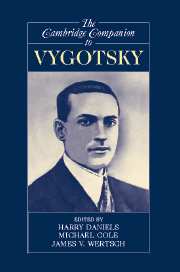Book contents
- Frontmatter
- Editors’ Introduction
- Part I: Vygotsky in Context
- Part II: Readings of Vygotsky
- 6 Terminology in L. S. Vygotsky’s Writings
- 7 Mediation
- 8 Vygotsky and Culture
- 9 Thought and Word: The Approaches of L. S. Vygotsky and G. G. Shpet
- 10 The Development of Children’s Conceptual Relation to the World, with Focus on Concept Formation in Preschool Children's Activity
- 11 Inside and Outside the Zone of Proximal Development: An Ecofunctional Reading of Vygotsky
- Part III: Applications of Vygotsky’s Work
- References
- Index
8 - Vygotsky and Culture
from Part II: - Readings of Vygotsky
Published online by Cambridge University Press: 28 November 2007
- Frontmatter
- Editors’ Introduction
- Part I: Vygotsky in Context
- Part II: Readings of Vygotsky
- 6 Terminology in L. S. Vygotsky’s Writings
- 7 Mediation
- 8 Vygotsky and Culture
- 9 Thought and Word: The Approaches of L. S. Vygotsky and G. G. Shpet
- 10 The Development of Children’s Conceptual Relation to the World, with Focus on Concept Formation in Preschool Children's Activity
- 11 Inside and Outside the Zone of Proximal Development: An Ecofunctional Reading of Vygotsky
- Part III: Applications of Vygotsky’s Work
- References
- Index
Summary
Vygotsky's ideas about culture are of special interest because he attributed such an essential role to culture in human psychological processes. However, any attempt to provide an adequate account of his ideas about culture and human nature faces formidable obstacles. To begin with, the term “culture” is virtually absent from the indexes of his published works. When we delve deeper into his texts, we find culture appearing in three distinctive forms.
First, culture defined as artistic products and the processes of creation, appears in such works as The Psychology of Art, as part of Vygotsky's long-standing interest in literary and cultural criticism. This early involvement of culture in Vygotsky's writings (which engaged him in debates with Russian formalists) appears later in his extensive use of literary examples to illustrate the operation of important psychological functions. Tolstoy, Dostoevsky, and several Russian poets provide important material for his arguments in Thinking and Speech.
Second, when we turn to Vygotsky's better-known works on the development of higher psychological functions, culture appears in two related forms. We find it appearing in terms such as “cultural-historical” and “cultural development,” which apply to the way in which the mediation of action through culture is a defining property of human psychological functioning.
- Type
- Chapter
- Information
- The Cambridge Companion to Vygotsky , pp. 193 - 211Publisher: Cambridge University PressPrint publication year: 2007
- 22
- Cited by

